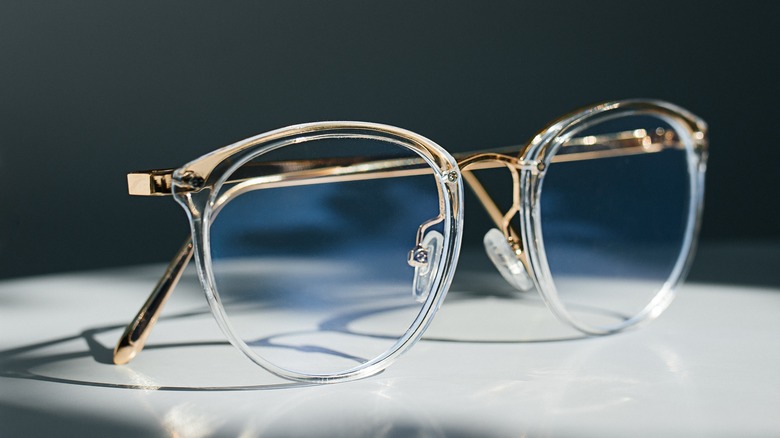Are Blue Light Glasses Actually Worth It?
With the amount of time we spend staring at our screens, you've likely heard about blue light glasses and how they can help prevent eyestrain. The average American spends over eight hours a day looking at their phones, televisions, and computers, so it's no surprise blue light glasses have become so popular. The special purpose of these glasses is to block the blue light emitted from the screens of our electronic devices. Too much blue light can irritate our eyes, and it can disrupt our sleep patterns and natural circadian rhythm (per Cleveland Clinic). When this particular light hits our eyes late at night, it effectively stops the production of melatonin, which is a hormone released in our brains when it gets dark out (per the Mayo Clinic).
Many of us rely on our computers and phones for work and for daily life, and blue light blocking glasses could provide the relief we need from extensive screen time. So, how do these glasses actually work, and are they worth the investment? Read on as we go into everything you need to know about blue light blocking glasses.
Everything you need to know about blue light blocking glasses
Blue light is part of the visible light spectrum we can see with the human eye. It has the shortest wavelength and the highest energy. Sunlight is actually the most significant source of blue light, with artificial sources like LED lights, fluorescent lights, and computer and phone screens following suit.
Blue light from the sun provides some benefits, like boosting our moods and helping us wake up in the morning. According to UC Davis Health, though, constant use of our digital devices is causing an overexposure to blue light. They found that the unfocused light scatters more easily, reducing contrast and contributing to eyestrain. Blinking less, dry eyes, and intense focus and concentration can also lead to eyestrain issues over time. Essentially, this means that blue light may not be the only culprit to your eye discomfort, but it is a significant factor.
Trying out blue light glasses, which are designed to block this specific type of light in an effort to prevent discomfort, is a good idea if you're feeling eyestrain more consistently. Late-night social media scrollers finding themselves with sleep issues could also benefit from using blue light glasses in the evening before they go to bed.
Additionally, there are many affordable and stylish options out there when it comes to blue light glasses. In fact, Glasses USA allows you to add a blue light filter to any pair of fashion (non-prescription) or prescription frames starting at only $19. With over 900 options, you're sure to find a pair to test for yourself.

